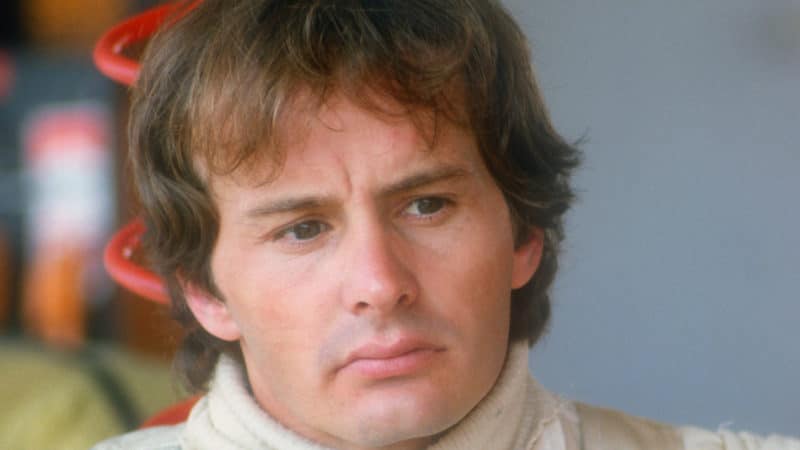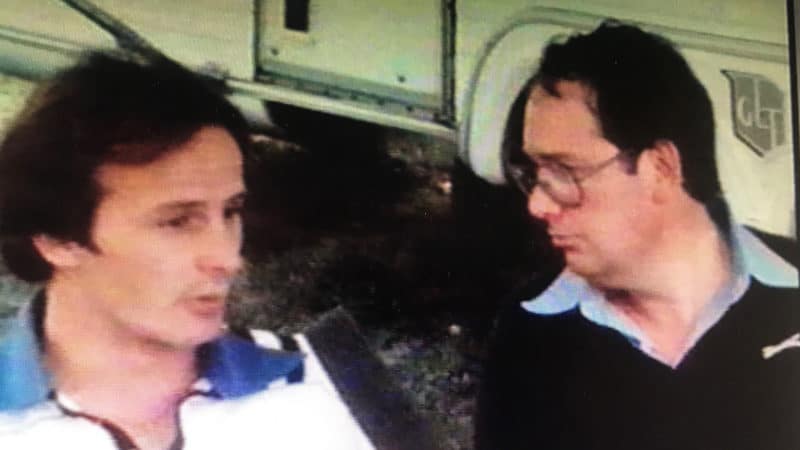He spent Thursday flying in his helicopter to a business meeting in the Cote d’Azur and then arrived at Monza on Thursday evening where he would be staying – unlike all the other drivers who preferred hotels – in his motorhome by the paddock.
Was racing in his blood? “I guess so,” said Villeneuve. “I just like it for the sake of the racing, not for the money in it although I like it for that also. I still like racing even if I am in say 18th or 15th place but I think some other drivers don’t give everything when they are at the back of the pack. You have to like racing, it is not something you can do well if you don’t do it with your own heart. But I think everyone who is Formula 1 now likes it.
“At the beginning it just happened that it was possible that I could go snowmobile racing. Car racing was my first love but I could not afford it. The opportunity was there to go racing snowmobile and I won a few races and the ball started rolling and I got a little name with that. So I made some prize money with that so I could afford to buy a Formula Ford then on and on..”
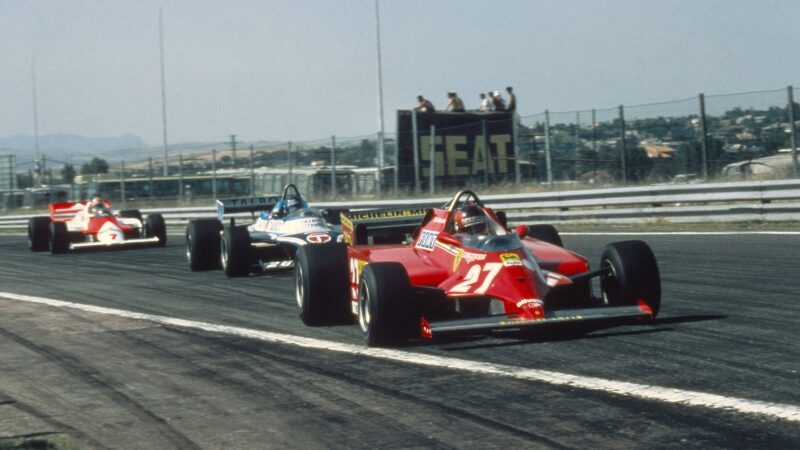
Villeneuve scored a rare 1981 win in Jarama, against the odds
DPPI
From his Formula 1 race, in an outdated McLaren at Silverstone in 1977, Villeneuve had been hailed as a future world champion, but the 1981 title wasn’t to be. After those couple of early wins, the Ferrari was unreliable and barely competitive. “Of course you prefer when the car is competitive and you can battle it up front and even if you don’t win, if you have finished second or third you know you have had a good race,” said Villeneuve.
“But that hasn’t been the case after Spain. Actually in Spain the car wasn’t that fast. Due to a series of circumstances I was leading and I was able to keep it like that. I think it was one of my best races – it was very tough to do. But then I guess the car fell back to where it belonged; in Spain the car should have finished sixth or seventh. I am not saying I made it finish first but I had the opportunity of leading and then not fade off. Since then it has been very tough but here it has been improving quite a bit, we have done good testing two weeks ago working on the springs, dampers, bump rubbers and skirts and the car is a lot more drivable than it has been for a long time.”
I then turned to the dangers of racing, and remember I was talking to a man who was considered to have a devil-may-care attitude although he was on the GPDA (driver) Safety Committee. “We work very hard at improving the circuits and I can tell that the grand prix circuits are the safest in the world and the lesser tracks are a lot less safe than the ones we race on because we have improved those with catch fences, that kind of thing. Yes the tracks can always be made safer but it is not too bad now. Also the cars are being made safer, more strong and everything. From a personal point of view, I don’t think much of that although, of course, I don’t want to kill myself, but I guess it is part of the job and we accept it the way it is.
“I know that maybe I can have an accident tomorrow and hurt myself and maybe have to be in hospital for a couple of months but you can always come back from that, so that’s the way I see it. There are maybe a couple of times a year I can have a big accident but, of course, I don’t want to have one but maybe one day I have one”
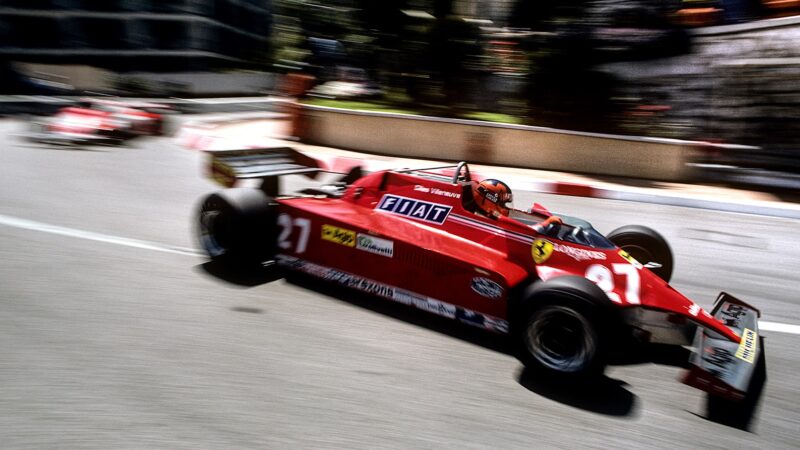
Villeneuve on his way to victory in the 1981 Monaco GP
Paul-Henri Cahier/Getty Images
After this staggeringly honest answer our conversation turned to his rivals and I asked if he had anyone he treated as a friend “ Yes, I do have close friends, mainly the French drivers, I don’t know why. They are not special people above the other nationalities but it just happened like that. I would say Patrick Tambay, Rene Arnoux, Alain Prost and Pironi my team-mate [whose first name wasn’t mentioned]. We are good friends but on the track we are just rivals.”
The interview had begun by my asking him how his lifestyle had changed since joining Formula 1. “Here in Monza it is very different from Canada but living in Monaco is, I guess, the closest town to what you can find in North America,” said Villeneuve in his accented English. As a Quebecois his first language was French and a couple of times he said he was out of practice speaking in English. “Life has changed a bit but we try to make it as close to how we lived in Canada. I first found it a bit tough when I moved to Europe as I think I am a typical Canadian or American, I found it very tough at first because some parts of living in Europe are very very different. But now after four years we are completely used to it and I like it.
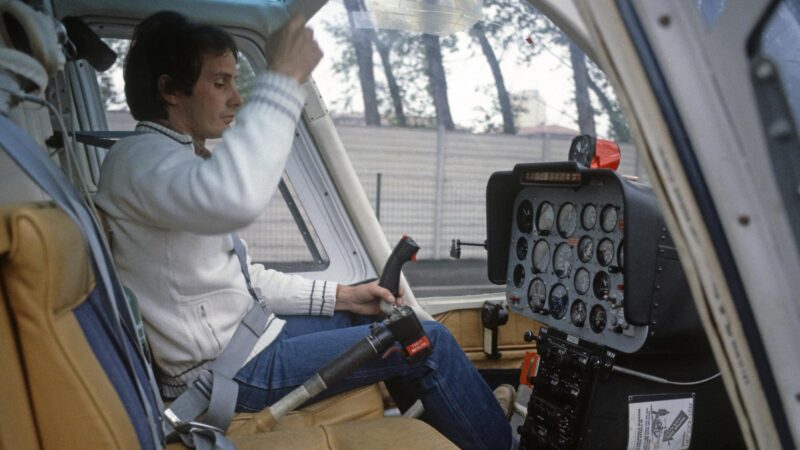
Villeneuve leased his helicopter from Walter Wolf
Grand Prix Photo
I ssked about the financial rewards racing in F1 had brought him and what he did with his money “Well some people put it in the bank to have more, but I don’t put much in the bank, I just spend it (laughs) but the helicopter that I am flying is not mine, it belongs to Walter Wolf and I, lease it off him – but always the things I get, I get them quite cheaply – so I get a good deal on it. A few months ago I bought an offshore powerboat but I did a kind of deal with the guy from Italy to do PR for him so that was a special price so although I spend a bit I always try to get a good deal. I don’t really spend much on clothes or even cars. But if I feel I want to buy something, if I can afford it, I buy it, which is pretty much like any Canadian, I guess.”
I knew Gilles had started a car collection, “It is not really one, I want to build a collection of some American cars and I have always been fond of Ford products back in Canada so perhaps I will create a collection on that make. Of course I have a Ferrari for the road but I don’t see any point in collecting them, it would be just be too expensive.
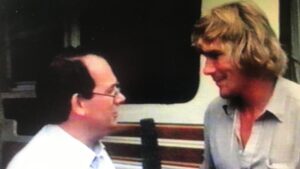
Asked about his strong qualities, Hunt replied: “Well, it is probably easier to look for his weaknesses which aren’t very many now. The year he could have won the championship – 1979 – when Ferrari had a good car and all that reliability, he rather threw it away. He made a lot of mistakes that year always from easy — from winning — situations.
“Unfortunately since that time he hasn’t been put to the test because he hasn’t been in that situation because he hasn’t had a good enough car. So that was his weakness, he is a terrific competitor, he has an abundance of natural talent that is second to nobody in the business and he is a thinker off the track. His weakness is that he didn’t think well on the track at that time.
“I think by now if you put him in a winning car, he wouldn’t be making those old mistakes. Now he is much more experienced but you would still have to test it to see – it is up to Ferrari to provide him with the car. His two wins in Spain and Monte Carlo were both a fantastic effort of qualifying a bad car well by sheer blood and thunder and then wrestling it around the track and not making any mistakes. The Spanish GP was absolutely brilliant because the car deserved to be about tenth.”
Andrew Marriott’s 1981 interview will form part of the upcoming Villeneuve Pironi documentary. The feature film from Noah Media and Sky Studios contrasts the intertwined lives of Ferrari friends then foes Villeneuve and Pironi with the aid of their family, Ferrari team members and rivals.
